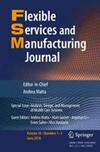管理多品种制造中的过早闲置
IF 3.2
3区 工程技术
Q2 ENGINEERING, INDUSTRIAL
引用次数: 0
摘要
摘要本文展示了劳动力转移在解决受控订单释放引起的过早闲置方面的有效性。受控订单释放限制了订单进入车间,通常用于高品种制造,从而带来稳定的在制品等好处。然而,当订单被阻止释放,而产能闲置时,它可能会增加等待时间。这个问题被称为过早闲置,会对交付性能产生负面影响。以前的研究主要集中在通过向闲置工作站发布新订单的输入控制来解决过早闲置问题。这种方法忽略了在过早闲置期间输出控制的潜力,在双重资源受限的情况下转移劳动力以协助其他工作站。通过仿真,本研究证明了输出控制显著提高了交货性能——就平均延迟率和延迟率而言——并减少了总生产时间和车间生产时间。重要的是,即使在辅助工作人员的效率受到严重限制的情况下,该结果也证明了鲁棒性。尽管工人的效率有所下降,但车间的绩效却有所提高。where-rule的影响是最小的,而优先调度规则的有效性取决于协作工人的共同效率。最后,我们表明,结合输入控制和输出控制可以提高性能,为进一步研究这两种控制方法在高品种制造中的作用提供了机会。本文章由计算机程序翻译,如有差异,请以英文原文为准。
Managing premature idleness in high-variety manufacturing
Abstract This paper shows the effectiveness of labour transfers in addressing premature idleness caused by controlled order release. Controlled order release restricts order entry to the shop floor and is commonly employed in high-variety manufacturing where it results in benefits such as stable work-in-progress. However, it can increase waiting times when orders are blocked from release, while capacities are idling. This issue, known as premature idleness, negatively impacts delivery performance. Previous studies have primarily focused on addressing premature idleness through input control by releasing new orders to idling workstations. This approach overlooks the potential of output control during premature idleness, transferring labour to assist at other workstations in a dual resource constrained setting. Using simulation, this study demonstrates that output control significantly improves delivery performance—in terms of mean tardiness and percentage tardy—and reduces total and shop floor throughput times. Importantly, this result proves robust, even when the efficiency of the assisting worker is severely limited. Shop-level performance improves despite the efficiency loss of the worker. The impact of the where-rule is minimal, while the efficacy of the priority dispatching rule depends on the joint efficiency of collaborating workers. Finally, we show that combining input control and output control enhances performance, providing opportunities for further research on the role of both control approaches in high-variety manufacturing.
求助全文
通过发布文献求助,成功后即可免费获取论文全文。
去求助
来源期刊

Flexible Services and Manufacturing Journal
ENGINEERING, MANUFACTURING-OPERATIONS RESEARCH & MANAGEMENT SCIENCE
CiteScore
5.60
自引率
7.40%
发文量
41
审稿时长
>12 weeks
期刊介绍:
The mission of the Flexible Services and Manufacturing Journal, formerly known as the International Journal of Flexible Manufacturing Systems, is to publish original, high-quality research papers in the field of services and manufacturing management. All aspects in this field including the interface between engineering and management, the design and analysis of service and manufacturing systems as well as operational planning and decision support are covered. The journal seeks papers that have a clear focus on the applicability in the real business world including all kinds of services and manufacturing industries, e.g. in logistics, transportation, health care, manufacturing-based services, production planning and control, and supply chain management. Flexibility should be understood in its widest sense as a system’s ability to respond to changes in the environment through improved decision making and business development procedures and enabling IT solutions.
 求助内容:
求助内容: 应助结果提醒方式:
应助结果提醒方式:


